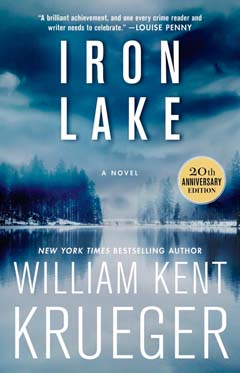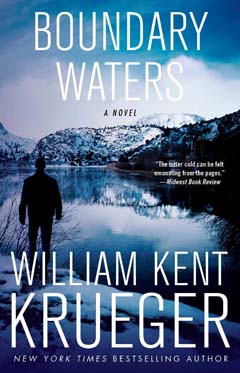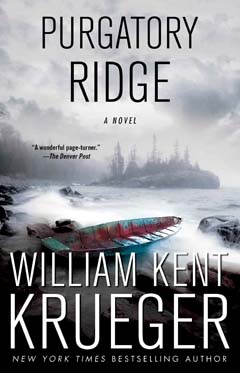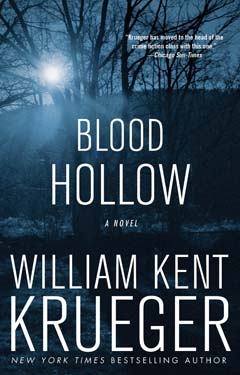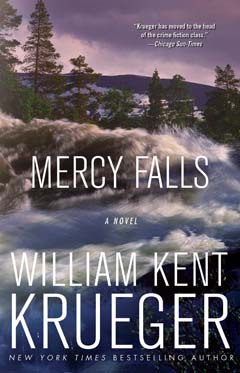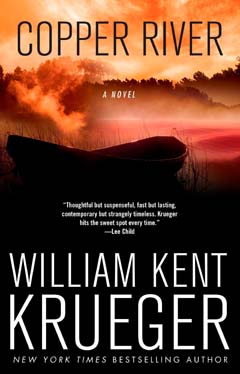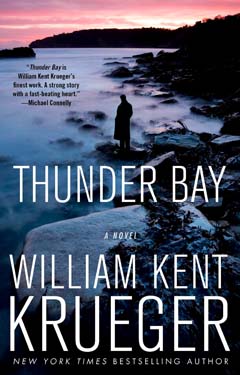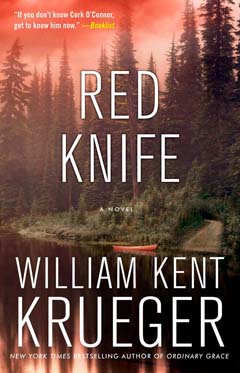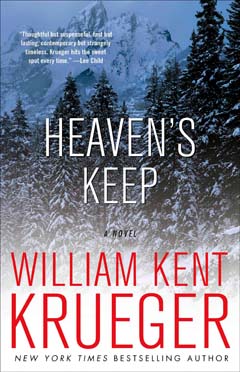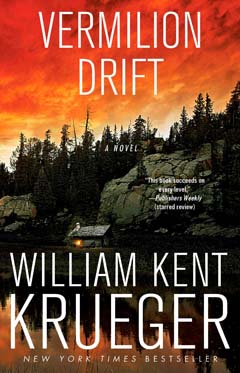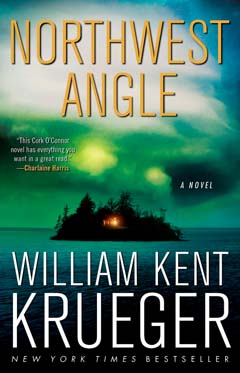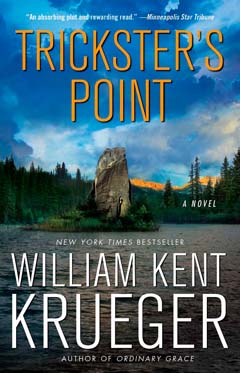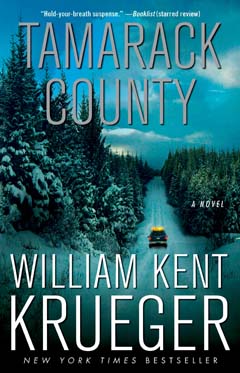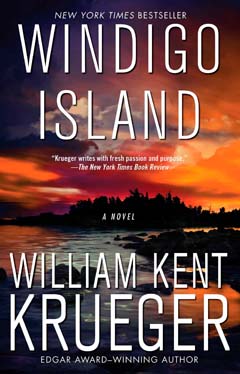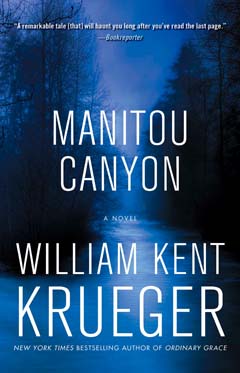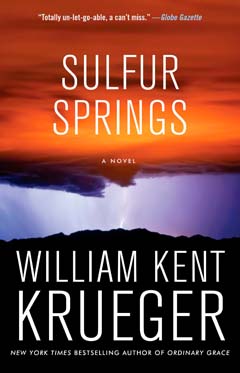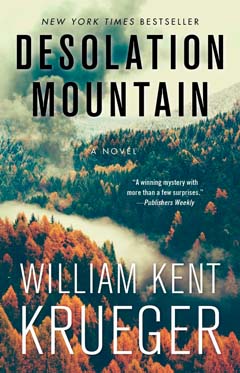A Cork O’Connor Mystery Novel – Book #4 | On Sale Now
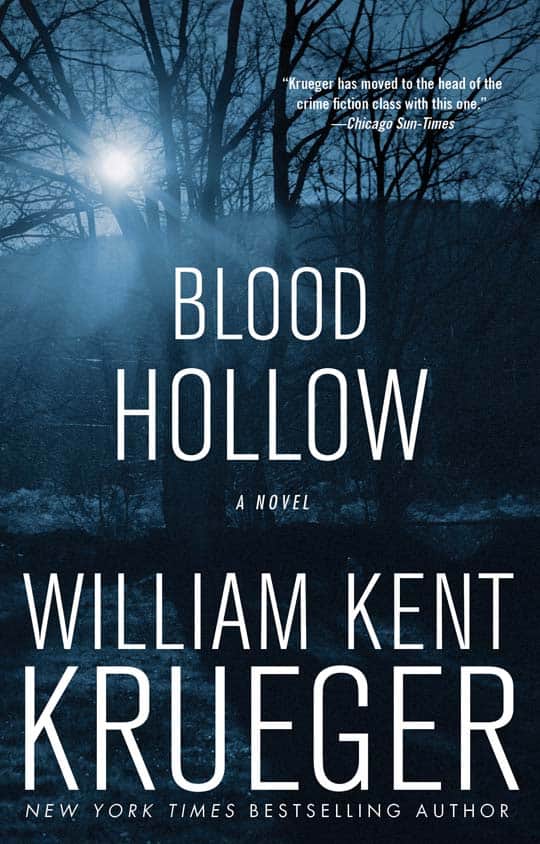
Order the Book
Atria Books Hardcover 2004, ISBN 0-7434-4586-4
Atria Books Trade Paperback 2009, ISBN 978-1439157794
DESCRIPTION
When a high school student’s body is found and her boyfriend goes missing, tough-as-nails former sheriff Cork O’Connor is forced into the center of an eerie mystery with a shocking twist in this “vivid and realistic” (Booklist).
When the body of a beautiful high school student is discovered on a hillside four months after her disappearance on New Year’s Eve, all evidence points to her boyfriend, local bad boy Solemn Winter Moon. Despite Solemn’s self-incriminating decision to go into hiding, Cork O’Connor isn’t about to hang the crime on a kid he’s convinced is innocent.
In an uphill battle to clear Solemn’s name, Cork encounters no shortage of adversity. Some—like bigotry and bureaucracy—he knows all too well. What Cork isn’t prepared for is the emergence of a long-held resentment from his own childhood. And when Solemn reappears, claiming to have seen a vision of Jesus Christ in Blood Hollow, the mystery becomes thornier than Cork could ever have anticipated. And that’s when the miracles start happening.
AWARDS
Winner, Anthony Award for Best Novel (2005), Bouchercon World Mystery Convention
Nominee, Minnesota Book Award for Popular Fiction (2005), Friends of the Saint Paul Library
Nominee, Northeastern Minnesota Book Award (2004), University of Minnesota
PRAISE
“The Corcoran O’Connor series deserves a larger audience… Krueger’s dead-on depiction of a rural American town is as vivid and realistic as any in the genre.”
—Booklist
“[A] chilling story with a warm heart… Krueger skillfully crafts enough plot twists to keep everybody guessing through the bloody climax to the thrilling end.”
—Publishers Weekly
“Writing as a naturalist, Krueger draws on Indian legends to communicate the mystery of the north woods; writing as a humanist, he looks to the spirits of the ancients to heal all wounds.”
—New York Times Book Review
“The prose in Blood Hollow is so good and the plotting so deft that readers will be hard put to stop reading once they begin. Krueger has moved to the head of the crime fiction class with this one.”
—Chicago Sun-Times
“Krueger’s mystery series set in the northern Minnesota town of Aurora, adjacent to the Ojibwe Indian Reservation and surrounded by the Vermilion and Mesabi iron ranges, exemplifies good use of setting…an excellent continuation of a superior mystery series.”
—Daily Camera (Boulder, CO)
“…a solid, well-plotted police procedural, William Kent Krueger handles Native American religion, fanatic Christians and conflicted Catholic priests with the same deft level of sensitivity.”
—Kansas City Star
“Krueger is at the top of his form.”
—St. Paul Pioneer Press
“Krueger delivers his superb sense of atmosphere in a solidly plotted tale of betrayal, bigotry and mysticism. Blood Hollow‘s twists continue to surprise even to the last line…Krueger knows how to skillfully plunge readers deeper and deeper into Cork’s world.”
—Sun-Sentinel (Ft. Lauderdale, FL)
EXCERPT
Chapter 1
January, as usual, was meat locker cold, and the girl had already been missing for nearly two days. Corcoran O’Connor couldn’t ignore the first circumstance. The second he tried not to think about.
He stood in snow up to his ass, more than two feet of drifted powder blinding white in the afternoon sun. He lifted his tinted goggles and glanced at the sky, a blue ceiling held up by green walls of pine. He stood on a ridge that overlooked a small oval of ice called Needle Lake, five miles from the nearest maintained road. Aside from the track his snowmobile had pressed into the powder, there was no sign of human life. A rugged vista lay before him—an uplifted ridge, a jagged shoreline, a bare granite pinnacle that jutted from the ice and gave the lake its name—but the recent snowfall had softened the look of the land. In his time, Cork had seen nearly fifty winters come and go. Sometimes the snow fell softly, sometimes it came in a rage. Always it changed the face of whatever it touched. Cork couldn’t help thinking that in this respect, snow was a little like death. Except that death, when it changed a thing, changed it forever.
He took off his mittens, deerskin lined with fleece. He turned back to the Polaris snowmobile that Search and Rescue had provided for him, and he pulled a radio transmitter from the compartment behind the seat. When he spoke through the mouth hole of his ski mask, his words ghosted against the radio in a cloud of white vapor.
“Unit Three to base. Over.”
“This is base. Go ahead, Cork.”
“I’m at Needle Lake. No sign of her. I’m going to head up to Hat Lake. That’ll finish this section.”
“I copy that. Have you seen Bledsoe?”
“That’s a negative.”
“He completed the North Arm trail and was going to swing over to give you a hand. Also, be advised that the National Weather Service has issued a severe weather warning. A blizzard’s coming our way. Sheriff’s thinking of pulling everybody in.”
Cork O’Connor had lived in the Northwoods of Minnesota most of his life. Although at the moment there was only a dark cloudbank building in the western sky, he knew that in no time at all the weather could turn.
“Ten-four, Patsy. I’ll stay in touch. Unit Three out.”
He’d been out since first light, and despite the deerskin mittens, the Sorel boots and thick socks, the quilted snowmobile suit, the down parka, and the ski mask, he was cold to the bone. He put the radio back, lifted a thermos from the compartment under the seat of the Polaris, and poured a cup of coffee. It was only lukewarm, but it felt great going down his throat. As he sipped, he heard the sound of another machine cutting through the pines to his right. In a minute, a snowmobile broke through a gap in the trees, and shot onto the trail where Cork’s own machine sat idle. Oliver Bledsoe buzzed up beside Cork and killed the engine. He dismounted and pulled off his ski mask.
“Heard you on the radio with Patsy,” Bledsoe said. “Knew I’d catch you here.” He cast a longing look at Cork’s coffee. “Got any left?”
“Couple swallows,” Cork said. He poured the last of the coffee into the cup and offered it to Bledsoe. “All yours.”
“Thanks.”
Bledsoe was true-blood Iron Lake Ojibwe. He was large, muscular, a hair past fifty, with a wide, honest face and warm almond eyes. Although he was now an attorney and headed the legal affairs office for the tribal council, in his early years he’d worked as a logger and he knew this area well. Cork was glad to have him there.
Bledsoe stripped off his gloves and wrapped his hands around the warm cup. He closed his eyes to savor the coffee as it coursed down his throat. “Anything?” he asked.
“Nothing,” Cork said.
“Lot of ground to cover.” Bledsoe handed the cup back and glanced north where the wilderness stretched all the way to Canada. “It’s a shame, nice girl like her, something like this.” He dug beneath his parka and brought out a pack of Chesterfields and Zippo lighter. He offered a cigarette to Cork, who declined. He lit up, took a deep breath, and exhaled a great white cloud of smoke and wet breath. He put his gloves back on and let the cigarette dangle from the corner of his mouth. Nodding toward the sky in the west, he said, “You hear what’s coming in? If that girl didn’t have bad luck, she’d have no luck at all.”
Cork heard the squawk of his radio and picked it up.
“Base to all units. It’s official. We’ve got us a blizzard on the doorstep. A real ass kicker, looks like. Come on in. Sheriff says he doesn’t want anyone else lost out there.”
Cork listened as one by one the other units acknowledged.
“Unit Three. Unit Four. Did you copy? Over.”
“This is Unit Three. Bledsoe’s with me. We copy, Patsy. But listen. I still haven’t checked Hat Lake. I’d like to have a quick look before I head back.”
“Negative, Cork. Sheriff says turn around now. He’s pulling in the dogs and air search, too. Weather service says it’s not a storm to mess with.”
“Is Wally there?”
“He won’t tell you anything different.”
“Put him on.”
Cork waited.
“Schanno, here. This better be good.”
Cork could see him, Sheriff Wally Schanno. Grim, harried. With a missing girl, a whale of a blizzard, and a recalcitrant ex-sheriff on his hands.
“I’m just shy of Hat Lake, Wally. I’m going to check it out before I turn back.”
“The hell you are. Have you taken a good look behind you?” Glancing back to the west, toward the cloudbank that was now looming high above the tree line, Cork knew time was short.
“It would be a shame to come this far and not make it that last mile.”
“Bring yourself in. That’s an order.”
“What are you going to do if I don’t? Fire me? I’m a volunteer.”
“You want to stay on Search and Rescue, you’ll come back now. You read me, Unit Three?”
“Loud and clear, Sheriff.”
“Good. I expect to see you shortly. Base out.”
Schanno sounded weary deep down in his soul. Cork knew that the sheriff would turn away from the radio to face the family of the missing girl, having just reduced significantly the chances of finding her alive. For Cork, being out there in the cold and the snow with a blizzard at his back was infinitely preferable to what Sheriff Wally Schanno had to deal with. Once again, he was exceedingly glad that the badge he himself had once worn was now pinned to the chest of another man.
“Guess that about does it,” Oliver Bledsoe said.
“I’m going to check Hat Lake.”
“You heard the sheriff.”
“I’ve got to know, Ollie.”
Bledsoe nodded. “You want a hand?”
“No. You go on back. I won’t be more than half an hour behind you.”
“Schanno’ll skin you alive.”
“I’ll take my chances with Wally.”
Cork climbed onto the seat, kicked the engine over, and shot east in a roar of sparkling powder.
He hated snowmobiles. Hated the noise, a desecration of the silence of the deep woods that was to him a beauty so profound it felt sacred. Hated the kind of people snowmobiling brought, people who looked at the woods as they would an amusement park, just another diversion in the never-ending battle against boredom. Hated the ease with which the machines allowed access to a wilderness that could swallow the ignorant and unwary without a trace. The only value he could see in a snowmobile was that it allowed him, in a situation like this, to cover a large area quickly.
By the time he reached Hat Lake, the dark wall of cloud behind him stretched north and south from horizon to horizon, completely blotting out the late afternoon sun. The sight gave Cork chills that had nothing to do with the temperature. He found no sign of a snowmobile on the trail that circled the lake. Exactly what he’d suspected, but he wanted to be certain. The wind rose at his back. He watched ghosts of snow swirl up and pirouette across the lake ice. Except for the dancing snow and the trees as they bent to the rising wind, nothing moved. Not one flicker of life across the whole, frigid face of that land.
Chapter 2
He didn’t beat the blizzard.
The trail climbed gradually over a ridge that roughly paralleled the Laurentian Divide, the spine of upper Minnesota, determining whether creeks and rivers ran north toward Hudson Bay or south toward the watershed of the Mississippi River. When Cork finally topped the ridge, he met the storm in a blast of wind. The machine he straddled shuddered under him like a frightened pony, and he plunged into blinding white, unable to see more than a few feet ahead.
Using the trees that lined the corridor as guides, he kept to the trail. Most of the time he rode due west, battling the wind head on. Whenever his way turned to the north or to the south, the trees provided a little shelter and gave him some relief. Dressed for bitter cold, he could, if he had to, simply hunker down and wait out the storm. It wouldn’t be pleasant, but it would be possible. He knew the area, knew that if he felt in grave danger, he could easily radio his position and a Sno-Cat would probably be dispatched. In all this, he understood he was more fortunate than the missing girl.
At last, he drew alongside a huge open area where the blowing snow was a maelstrom, a blinding swirl across the frozen expanse of Fisheye Lake. The trail circled the lake, but snowmobilers often cut a path straight across the ice rather than follow the parabola of the shoreline. Cork knew if he did the same, he’d save himself a good twenty minutes, which at the moment seemed like a long time. He checked his compass, took a bearing, revved his snowmobile, and charged onto the ice.
On the flat, frozen lake, a bleached wall blotted out the rest of the world. There was no up or down, no left or right, no ahead or behind; there was only a hellish, acid brilliance blasting at him from every direction. He gripped the compass in his hand and kept the nose of the snowmobile lined up with the bearing point he’d chosen. In a few minutes, he would reach the far shoreline and the relative shelter of the trees.
He hadn’t counted on seeing the missing girl.
He jerked the machine hard to the left. The snowmobile tipped. He let go his hold, flew off the Polaris. The ice was like concrete and sent a bone-rattling jolt down his body when he hit. He rolled several times before he came to rest on his back staring up (was it up?) into blinding white. For a moment, he lay perfectly still, putting together what his perception had taken in but his mind hadn’t fully processed, then he staggered to his feet.
Had he actually seen the girl materialize in front of him? Something had been there, little more than a gray wraith barely visible behind the curtain of snow.
“Charlotte!” He shouted into a wind that ate the word. “Charlotte!”
He turned, then turned again. He moved a few steps forward. Or was he going back? The compass had flown from his hand when he spilled off the snowmobile, and he had no idea of direction.
“Charlotte Kane!” he tried again.
No matter which way he turned, the wind screamed at him. He lifted his goggles. The driving snow attacked his eyeballs, a thousand sharp needles, and bitter fingers seemed to pry at his sockets. He squeezed his eyes shut and tried again to recall exactly what he’d seen in the instant before he’d lost control.
There had been something directly ahead of him, a vague gray shape, no more. Why had he thought it was the girl? He realized that if it were Charlotte Kane, he hadn’t had enough time to turn aside before he hit her, yet he’d felt no impact. Had the blizzard simply played a cruel trick on him?
He had no idea where the Polaris was, and nearly blind in the white, he began to grope around him.
This was exactly what Schanno had been afraid of, losing one of the search team. Cork, in his arrogance, believing that he might yet find the missing girl, had only made matters worse. Unless he was able to locate the snowmobile or the radio, Search and Rescue would have no idea where he was, no knowledge that he’d screwed himself, tumbled onto the ice of Fisheye Lake and got lost in a whiteout there. He was about to become another weight on the shoulders of the other searchers.
He tried not to panic, telling himself he could wait out the storm. But that was a supposition, not a known. For all he knew, the blizzard could last a week. Where would he be then?
He’d just resettled the goggles when he saw it again out of the corner of his eye, the flicker of gray behind the white.
“Charlotte!” He stumbled in that direction.
Blindly, he groped ahead a dozen steps, then another glimpse of the phantom, left this time, and he turned and hit his shinbone against the snowmobile which was sitting upright, half-buried in a drift that was growing deeper even as Cork stood there, amazed and grateful.
The compass was hanging from the handgrip. Cork did a three-sixty, one last scan of the small circle his eyes could penetrate. He took his bearing, kicked the machine into action, and headed toward safety.
It took him another hour to reach the graded road that led him to Valhalla on Black Bear Lake.
Valhalla was the Northwoods retreat of Dr. Fletcher Kane, a widower, and his sister Glory. The main structure was a lodge-like affair, two stories, five bedrooms, three baths, a couple of stone fireplaces and fifty-five windows. All the numbers added up to a piece of property worth a million plus dollars situated at the end of a graded road twenty miles from Aurora, Minnesota, the nearest town, and about as far from any neighbors as a person could get in that stretch of woods. In addition to the house, a small guest lodge had been constructed a hundred yards south on the shoreline of Black Bear Lake. It was in the guest house that Wally Schanno had set up the base for the search and rescue operation. Since leaving that morning, Cork had been back once, near noon, to gas up and to grab a quick sandwich. The guest house had been a hub of activity then. This time when he pulled up on his Polaris, the place was dead. A dozen other snowmobiles were parked among the trees. The trailers that had brought the machines stood empty and unconnected, the hitches buried in snow, the trucks and SUV’s that had hauled them gone. The only vehicles remaining were Cork’s old red Bronco and a Land Cruiser from the Tamarack County Sheriff’s Department.
The driving snow made it difficult to see much of anything. Still, Cork could make out the big house and a tall, lone figure standing in a lighted window, staring toward the frozen lake.
A wonderful warmth hit Cork the moment he stepped into the guest house. He threw back the hood of his parka and pulled off his ski mask. All day he’d been cold, but not until the heat of the room hit him and made his icy skin tingle did he let himself acknowledge fully just how cold. And hungry. For along with the heat came the good smell of hot stew.
Rose McKenzie, Cork’s sister-in-law, was the only other person in the room. She was a heavy, plain-looking woman, as good-hearted as anyone Cork had ever known. She’d lived with the O’Connors for more than fifteen years, had come to help raise their children, and in the process had become a beloved and integral part of their lives. When she’d learned of the search that was to be undertaken, she’d offered to do what she could to help. Because she had a reputation as a marvelous cook, it had been obvious from the start how she could best contribute.
She turned from the stove. “Thank God. I was worried. You’re the last one in.”
Cork hung the parka on a peg beside the door. The polished floorboards of the guest house were marred by dozens of wet boot prints. “The others?”
“They all left a few minutes ago, following Freddie Baker’s plow. You need to leave pretty soon, too, before the road drifts over.”
“Not until I’ve had some of that stew.”
“That’s why I kept it hot.”
Coming in from the cold affected Cork in the usual way. He headed to the bathroom where he stood at the toilet for a full minute relieving himself. When he came back, Rose had a filled bowl, a napkin, and a spoon on the table.
“Can I get you something to drink?”
“I’m fine with just the stew, Rose.”
He leaned to his bowl. Steam, full of the smell of beef and carrots and onions and parsley and pepper, rose up against his face. Cork thought heaven couldn’t smell any better.
“Where’s Wally? Up at the house?” he asked.
Rose moved to the sink and began to wash the last of the dishes, except for what Cork was using. “Yes,” she said.
“How are Fletcher and Glory doing?”
She turned, wiping her fleshy hands on her apron, one Cork recognized from home. She crossed to a window and looked toward the big house. “They’re scared,” she said.
There was a history of bad blood between Fletcher Kane and Cork. Glory was a chilly enigma that no one, not even Rose who was her friend, quite seemed to understand. Yet Cork had put aside his personal feelings because he was a parent himself, and the idea of a child, anyone’s child, lost in that kind of hell left a metallic taste of fear in his own mouth that even Rose’s wonderful stew couldn’t wash away.
“I hated coming in,” he said.
“Everybody did.”
The guest house had a small kitchen and dining area that opened onto a larger living room with a fireplace. The living room had been set up for the search. The radio sat on a big table near a window. Beside it lay the search log and other documents, including a blown-up photograph of the missing girl, a pretty teenager with black hair and a reserved smile. A topographical map of the area had been taped to the wall. Cork could see the pins in the map, each search team denoted by a pin with a particular color. They’d covered what ground they could, but that was the problem. Charlotte Kane had vanished in the night on a snowmobile without telling anyone where she was going. She left a New Year’s Eve party that she’d thrown at Valhalla without her father’s consent. She was seventeen and intoxicated. Twenty-one inches of snow had fallen after her departure. Trackers—volunteers from the U.S. border patrol—had blown away the powder, what they called blue smoke, and had been able to say only that she’d headed to the graded road where she’d connected with a heavily-used snowmobile trail that eventually branched in a dozen directions, and each branch in a dozen more. There was no guarantee that she’d even kept to the trails. With a full tank of gas, she could have made it halfway to North Dakota or all the way to Canada. It was an enormous area, an impossible area, to cover thoroughly.
“The air-scent dogs?” Cork asked.
Rose shook her head. “Nothing.” She headed back to the sink.
“Thanks,” Cork said.
“For what?”
“Coming out. Helping.”
“A lot of folks have helped.”
“You’re still here.”
“Somebody has to feed you. Jo would never forgive me if I let you starve or freeze to death.” As soon as she said it, she looked sorry. She put a hand to her forehead. “That wasn’t funny.”
“It’s okay, Rose.”
The door opened and a cold wind blasted Deputy Randy Gooding into the room and a lot of snow with him. He took a moment and breathed deeply the warm air inside.
“And I thought winters in Milwaukee were tough,” he finally said.
Gooding was tall and wiry, late twenties, good looking in a square-jawed way, and possessed of a friendly disposition. Although he’d been in Aurora less than two years, he seemed to have fit nicely into the pace of life there. Like Cork, he was a man who’d fled the city for the north country, looking for a simpler way of life.
Gooding acknowledged Cork with a nod. “Sheriff wanted me to check, make sure you made it in okay.”
“Is he up at the house?”
Gooding tugged off his gloves and his dark blue stocking cap. “Him and Father Mal. Dr. Kane’s not happy that the plug’s been pulled on the search.”
Cork put his spoon down and wiped his mouth with his napkin. “If it were my daughter, I wouldn’t be happy either.”
“How’s Glory?” Rose said.
Gooding breathed into his hands. “She’s sedated herself pretty well,” he said. “Blue Sapphire gin.”
“It’s hard to blame her,” Rose said.
Gooding shook his head. “Tough on the doc, dealing with it all himself. He just stands at the window staring out as if that’ll make her materialize somehow.”
Rose turned to the stew pot and stirred with a wooden spoon. “I took some food up earlier. I’m not sure they ate anything. They’ll be hungry eventually.”
“The sheriff wants everybody ready to move,” Gooding said. “He’s afraid the snow’s going to close in right behind Baker’s plow.”
Rose glanced at Cork, and he knew before she spoke what she was going to say. “Somebody should stay. Those folks should not be left alone out here.”
“Father Mal’s planning on staying,” Gooding said.
“Father Mal can’t cook. He can’t even boil water right.”
Cork said, “I think he figures to offer a different kind of sustenance, Rose.”
She gave him a sharp look. “I understand that. But they’ll all need to eat. It’s hard to hold on to hope when you’re hungry.”
The door banged open, and once again the storm muscled its way in with the men who entered. Sheriff Wally Schanno carried on with the conversation he’d been having with Father Mal Thorne.
“With this storm blowing like it is, I can’t guarantee we’ll be back tomorrow.”
“All the more reason I should stay,” the priest said. “These people shouldn’t be alone at a time like this.”
Side by side, the two men were distinct contrasts. Schanno was tall and gaunt, his face gouged by worry. He was in his mid-sixties, but at that moment, he looked far older. Father Mal Thorne was younger by twenty years. Although he was a much smaller man, his compact body seemed to hold double its share of energy. Broad-chested and in good condition, he always reminded Cork of a tough pugilist.
Schanno noticed Cork. “Thought I told you to skip Hat Lake and come straight in.”
“I made it back in one piece, Wally.”
The sheriff looked too tired to argue. “See anything?”
Cork thought about the gray visage behind the snow, the sense that he’d been guided back to his snowmobile, that somehow Charlotte had tried to reach out to him.
“No,” he finally said.
“Well, we’re all accounted for now. Let’s get this show on the road before we get stuck out here.”
“I’m staying,” Rose said.
Schanno began to object. “Goll darn it—”
“Thank you, Rose,” Father Mal broke in. He smiled at her, and there were boyish dimples in his cheeks. “But you don’t have to do that.”
“They’ve got enough on their minds without worrying about fixing food or cleaning up. You, too. Your hands will be full, Father.”
Mal Thorne considered it and decided in the blink of an eye. “All right.”
Schanno opened his mouth, but the priest cut him off.
“The longer you stand here arguing, Wally, the worse that road gets.”
“He’s right, Sheriff,” Gooding said.
Schanno gave in and nodded unhappily.
Cork stood up. He began to gather his dirty dishes to take them to the sink.
“I’ll take care of those,” Rose said. She hugged him. “Give my love to Jo and the kids.”
“I’ll do that. And I’ll see you tomorrow. You, too, Mal.” He put on his parka and his deerskin mittens. “I’m ready.”
Schanno dug keys out of his pocket and handed them to his deputy. “You take the Land Cruiser. I’m riding with O’Connor.”
Gooding shrugged. “Whatever you say.” He opened the door and pushed his way into the storm.
Cork stood in the open doorway a moment, looking back at Rose and Father Mal. They were only two people, but he had a sense of something huge about them and between them, a vast reservoir of strength that neither the blizzard nor the long vigil they were about to keep could empty.
“Shut the damn door,” Father Mal said.
The Bronco was buried in a drift that reached to the grill.
“You get in and get ‘er started,” Schanno shouted over the wind. “I’ll clear the snow.”
Cork grabbed the brush from beneath the front seat and tossed it to Schanno, then got in and turned the key. The starter ground slugglishly.
“Come on,” Cork whispered.
The engine caught and roared to life. Cork kicked the defrost up to full blast. Schanno cleared the snow from the windows and the tail pipe and climbed into the Bronco.
“Damn,” the sheriff said, hunching himself against the cold.
Cork couldn’t agree more.
In a couple of minutes, Gooding eased the Land Cruiser forward, and Cork followed slowly.
Dark had come early, descending with the storm. Cork could barely see the taillights ahead of him. The glare of his own headlights splashed back off a wall of blowing snow that appeared solid as white-washed concrete.
He knew Schanno was right to have been concerned about the road, knew that in a blizzard, snow became fluid in the way it moved. It ran like water around tree trunks, eddied against buildings, filled in depressions. It had already flowed into the trench that Freddie Baker had plowed not more than half an hour before, and as he followed in Baker’s wake, Cork felt a little like Pharaoh of the Exodus with the Red Sea closing in.
“What is it, Wally?”
“What’s what?”
“You rode with me, not with Gooding. I’m guessing you wanted to talk.”
Schanno took his time answering. “I’m tired, Cork. Worn to the nub. I figured you’d understand, that’s all.” He let out a deep breath. “Hell of a way to start a year.”
It was the second day of January.
The interior of the Bronco was lit from the reflection of the headlights off the snow. Schanno leaned forward peering hard ahead. His face was gray and deeply hollowed. Skeletal.
“Hell of a way to end a career,” he said.
He was talking about the fact that in a few days a man named Arne Soderberg would be sworn in as Tamarack County sheriff, assuming the responsibilities for that office for the next four years.
“You’ve done a good job, Wally.”
“I did my share of stumbling. We both know that.” Schanno pulled off his gloves and put his big hands on the dash, as if preparing himself for an impact. “Soderberg. He’s no cop. Should be you taking the badge.”
“I didn’t want the badge,” Cork reminded him. “Even if I’d run, there’s no guarantee I’d have won.”
“You’d have won,” Schanno said. “You betcha, you’d have won.”
“You’re not sorry to be leaving, are you, Wally?”
“Today, not at all.” Schanno took his right hand off the dash and rubbed his forehead for a moment. The winter air had dried and cracked the skin of his fingers. “I told Garritsen when he comes tomorrow he should bring along his cadaver dog.”
They hit an open area, and the wind slammed against the side of the Bronco with the force of a charging moose. Cork yanked the steering wheel to keep from plowing into a snow bank.
He didn’t want to talk about cadaver dogs.
“You and Arletta got plans?” he asked.
“Going to spend the rest of the winter in Bethesda, enjoying our grandkids.”
“Looking forward to retirement?”
Schanno thought about it for a minute. “I’m looking forward to not being the guy who calls in the cadaver dog.”

